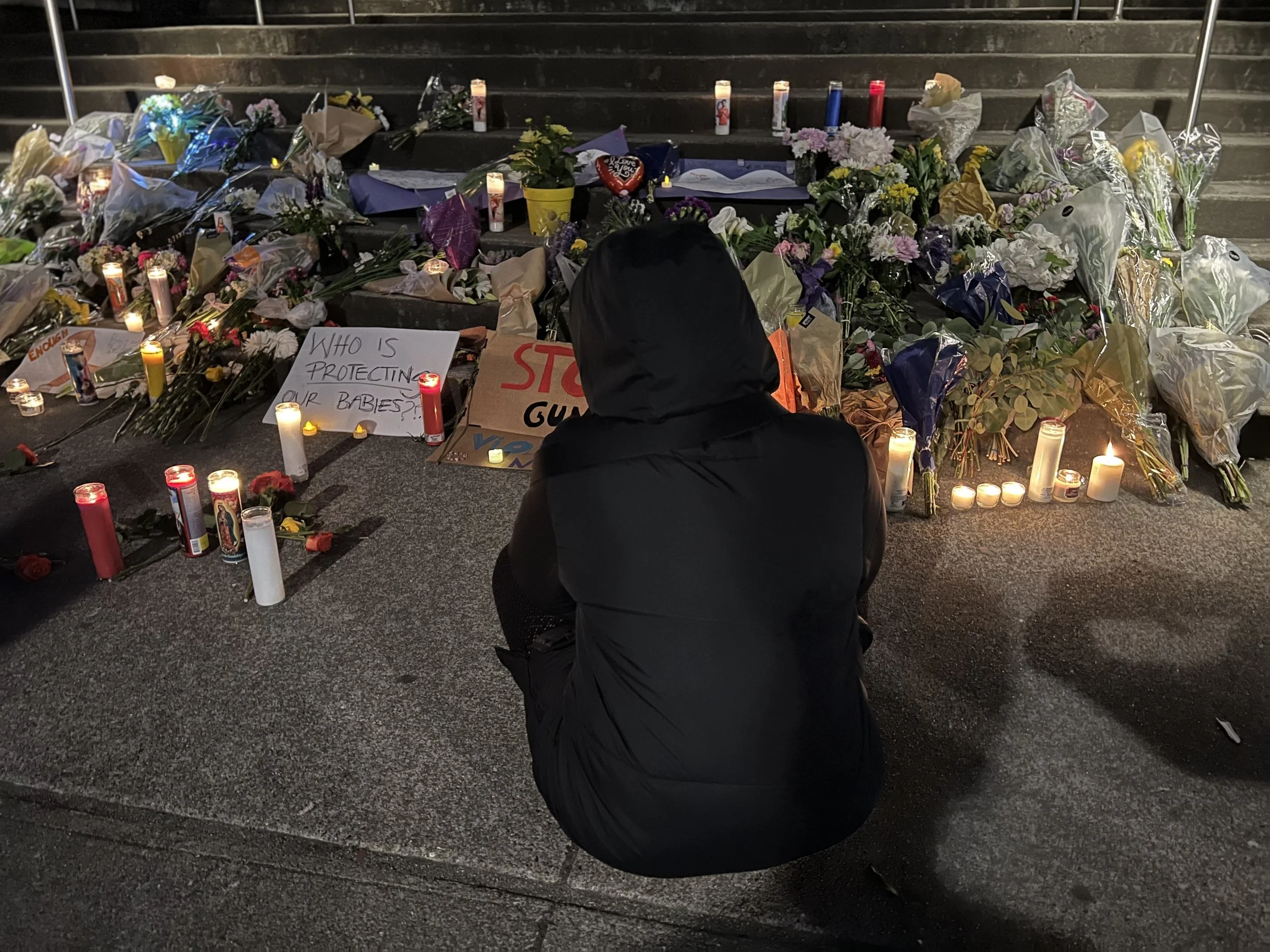King County's Gun Violence Drop: Promising, But No Time for "Victory Laps"
A student sits next to a candle light vigil on the steps of Garfield High School on June 7th, 2024 following the murder of Amarr Murphy-Paine. (Photo: Omari Salisbury)
By Omari Salisbury
New data from the King County Prosecuting Attorney's Office reveals a significant and sustained multi-quarter drop in gun violence, with firearm homicides and injuries reaching a five-year low in the second quarter of 2025. This positive trend, which began in 2024 and continued into the first quarter of 2025, is being attributed to a collaborative approach involving law enforcement and community-based organizations.
According to the "2025 Q2 King County Quarterly Shots Fired Report", the number of shooting homicide victims in Q2 2025 was 14, and non-fatal shooting victims numbered 55. This represents a 22% drop in firearm homicide victims and a 33% drop in non-fatal shooting victims compared to Q2 2024. Total shots fired incidents also decreased by 25%, with nearly 100 fewer incidents. Prosecuting Attorney Leesa Manion emphasized that "(the) data shows that the decreases in gun violence in 2024 and the first quarter of this year were not a fluke".
Eleuthera Lisch, Director of the Regional Office of Gun Violence Prevention in Public Health for King County, echoed this optimism. "It's really exciting to see something like a reduction by 40% of homicides in King County, and to see it trending down," Lisch stated, noting that while jurisdictions nationwide were trending down, Washington State had been trending up. She added, "to see us turn the corner and to start in the last two quarters to see such a significant downturn is really positive, and we're excited to see it, although with only two quarters of data, we're not going to rest on that".
VIDEO: Eleuthera Lisch, Director of the Regional Office of Gun Violence Prevention, during an interview with Trae Holiday on the 100 Days of Action Special last September at the Paramount Theatre.
A key factor in this success appears to be the maturing of community violence intervention (CVI) efforts and better coordination between law enforcement and community partners. Lisch explained, "What's different in this season is that community violence intervention has been added into traditional public safety work and is beginning to be recognized as part of holistic public safety and a significant contributing factor. No one entity is going to solve this alone".
Dominique Davis, CEO and Founder of Community Passageways, a community safety and support organization, highlighted the impact of sustained funding. "This is the result of the long-term funding that was needed for the organizations that do the work in the community to be able to be sustainable," Davis said, referring to initiatives like the Seattle Community Safety Initiatives (SCSI). He noted that his organization, along with others, received non-competitive contracts and consistent funding for the past four and a half years. "It takes up to four to five years for something like this to work, because we're talking about issues that have been happening in our community for decades," Davis asserted.
Davis passionately argued that the numbers are proof of what's working. "Why mess with something that's working? The numbers are proof that it's working, and we need to keep investing in what's working," he urged. He also challenged the notion of quantifying averted shootings, stating that it's difficult to measure what didn't happen and can be seen as a "racist question" when applied to Black and brown youth. Instead, he emphasized the importance of investing in opportunities: "The goal should be, how much are we investing into opening up opportunities for these young people in these families? What should be the goal? What are we investing into it? Because on the back end, you're going to find the results we're getting right now".
VIDEO: Mark Rivers, Deputy Director at Community Passageways, shares his insights on the work of violence prevention and intervention in his interview with TraeAnna Holiday during her 100 Days of Action Special at the Paramount Theatre in September 2024.
Both Davis and Mayor Bruce Harrell emphasized the need for continued commitment. Mayor Harrell stated, "So the first thing I think it entails is leaders like those around and even myself understanding the importance of reducing gun violence... we've implemented best practices, which also means investing in community-based organizations". He acknowledged the promising numbers but added, "we're not taking victory laps in this work. We lose one life. That's one life too many".
Davis echoed this sentiment, advocating for "long-term, five-year commitments in place for this work that we do in the community, long-term, sustainable five-year commitments, funding shouldn't be yearly". Lisch also agreed with Mayor Harrell's "no victory lap" stance. "I hope my comments so far underscore that this is not a fluke, and secondly, we're nowhere near done, and any death is unacceptable. So there's no space for a victory lap," Lisch affirmed, emphasizing that "until we get to zero, and until zero stays zero for a very long time. We cannot declare a victory, and shouldn't declare a victory".
While federal COVID relief dollars that supported some of this work have sunsetted, and budgets remain a challenge, Lisch stressed that the message of long-term investment is "widely received and understood." She concluded by stating, "This is when we double down and make sure that it's sustainable”. The combined efforts of law enforcement, public health initiatives, and dedicated community organizations appear to be turning the tide on gun violence in King County; however, for those impacted most by gun violence in our county, we can only hope that it’s truly not a fluke and the guns will fall silent and stay silent.


